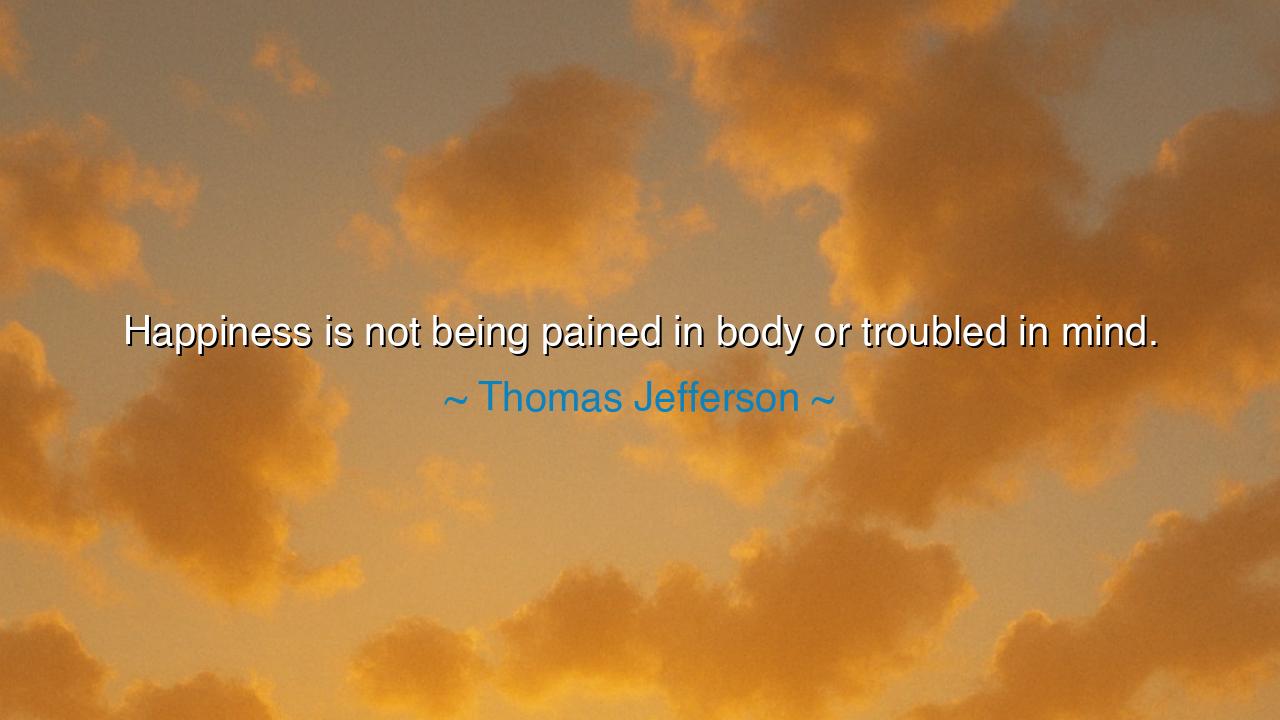
Happiness is not being pained in body or troubled in mind.






“Happiness is not being pained in body or troubled in mind.” — Thus wrote Thomas Jefferson, one of the great architects of liberty, whose mind sought to balance reason with the delicate needs of the human spirit. In these few words lies a quiet but profound truth — that happiness is not always found in splendor or achievement, but often in the simple absence of suffering. To be free from pain and disturbance, both in body and in mind, is to taste a peace more valuable than wealth or fame. Jefferson, a man of both action and contemplation, knew that true contentment does not roar with triumph; it rests gently, like a calm sea after a storm.
The origin of this thought can be traced to Jefferson’s own philosophy, shaped by both Enlightenment reason and ancient wisdom. He was deeply influenced by the teachings of Epicurus, the Greek philosopher who taught that happiness — or eudaimonia — lies not in endless pleasure, but in tranquility: the state of being untroubled, self-sufficient, and free from fear. For Jefferson, as for Epicurus, the highest joy was not excess, but balance. To have health of body and serenity of mind was the foundation upon which all other joys could stand. Thus, his definition of happiness was both humble and divine — not an ecstasy to be chased, but a state of harmony to be cultivated.
To be free from pain in body is to honor the vessel that carries the soul. The body is not an enemy, but an ally in the pursuit of happiness. Jefferson, who loved the earth, the rhythm of work, and the vigor of nature, saw that physical suffering clouds even the brightest mind. But more dangerous still is the trouble of the mind — the restlessness, guilt, or fear that steals joy even in comfort. For a wounded mind is a prison, and no riches, no power, can redeem the man who lives under its shadow. The wise, therefore, tend to both body and mind, knowing that neither can flourish without the other.
History gives us a clear mirror for Jefferson’s wisdom in the life of Marcus Aurelius, the philosopher-emperor of Rome. Surrounded by war, burdened with empire, and often in physical pain, Marcus wrote in his Meditations that “the happiness of your life depends upon the quality of your thoughts.” Though he ruled a vast world, he understood, as Jefferson did, that peace is not found in possessions, but in mastery of the self. Even amidst hardship, Marcus sought stillness — freedom from bitterness and from the tyranny of fear. His calm amid the chaos of empire stands as proof that happiness is not an external prize, but an internal condition of clarity and acceptance.
Jefferson’s words also contain a quiet warning to modern souls. In an age where people chase endless stimulation, wealth, and validation, many mistake excitement for happiness. But excitement is fleeting, and its flame burns the hand that holds it. True happiness, Jefferson reminds us, is not in the fever of acquisition, but in contentment — in the ability to rest, to breathe without anxiety, to live without inner torment. It is not found in noise, but in stillness; not in conquest, but in gratitude. A heart that is untroubled and a body that is well cared for — these are the treasures that kings and peasants alike may claim.
Yet Jefferson’s vision of happiness is not a call to idleness, but to wisdom. To be untroubled in mind does not mean to be unfeeling; to be free from pain does not mean to avoid life’s challenges. Rather, it means to face life’s trials with a steady heart — to know when to labor, when to rest, when to speak, and when to let silence heal. It is a life guided by balance: the harmony between effort and peace, ambition and acceptance. In this way, happiness is not a reward but a discipline, cultivated through the daily practice of gratitude, temperance, and self-care.
So, my listener of the ages, remember this truth that Jefferson passed down like a torch: happiness is not in the abundance of what you possess, but in the quiet order of your soul. Care for your body, for it is the temple through which life moves. Guard your mind, for it is the well from which all joy flows. When pain comes, do not curse it — seek its lesson, then release it. When peace visits you, cherish it like sacred light. For happiness, in the end, is not something to be chased across mountains and seas — it is the stillness that waits within you when both body and spirit are at rest.
And if you can reach that place — where pain does not dominate and the mind is not troubled — then you will have found the happiness Jefferson spoke of: simple, profound, enduring. It is not the happiness of noise and glory, but the happiness of peace — a happiness that asks for nothing more, and yet gives everything in return.






AAdministratorAdministrator
Welcome, honored guests. Please leave a comment, we will respond soon